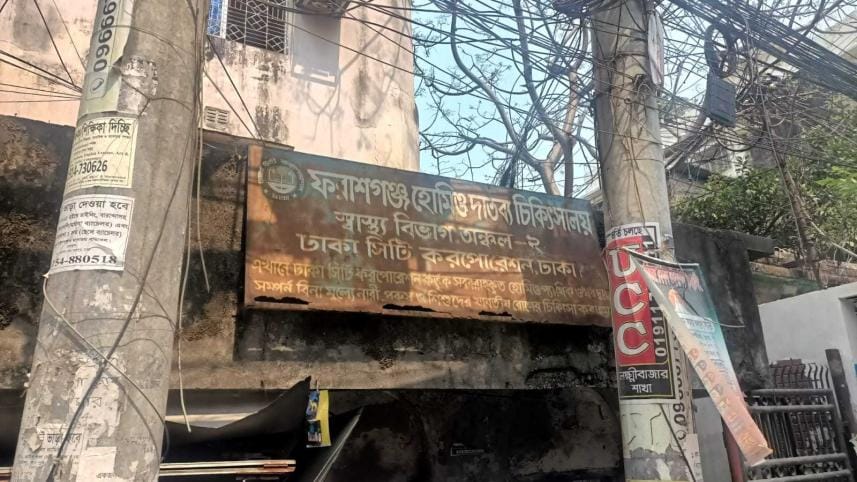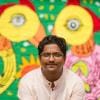The slow death of DSCC’s homeopathy clinics

The walls of the dilapidated single-storey building are crumbling, with plaster peeling away. The floor has worn down, exposing bricks and sand beneath. A rusted signboard, corroded in several places, hangs above the entrance. Inside, a doctor continues to treat patients and dispense medicine despite the deteriorating conditions.
This is the state of the Farashganj Homeopathy Charitable Dispensary, one of the homeopathy clinics run by the Dhaka South City Corporation, located at Dalpatti Mor in Sutrapur.
A visitor is met with a collection of old furniture -- an empty, dust-covered wooden showcase, four worn-out chairs, a table, a steel cabinet, and a single patient bench.
The cabinet holds DSCC-provided medicines and essential documents. Despite its dilapidated state, patients continue to visit the dispensary regularly.
"We once had a compounder and an assistant (aya), but now only a security guard remains. Once I retire, this clinic will close, as no new doctors will be appointed," Dr Farzana Begum, the clinic's physician, told The Daily Star.
Farzana, who joined DSCC's health department in 2005 and was assigned to this dispensary, said she had treated and prescribed medicines for over 500 patients in just the first two months of this year.
"There is no publicity for these charitable homeopathy centres. If there were, more patients would visit," she added.
Another DSCC homeopathy centre, Rokanpur Homeopathy Charitable Dispensary, has changed its original location and now operates from the third floor of the DIT Market in Lakshmibazar, Old Dhaka.
Finding this clinic amidst a cluster of coaching centres is a challenge in itself.
Two more charitable homeopathy clinics exist under DSCC -- Katara Homeopathy Charitable Dispensary in Chawkbazar and Sat Shahid Homeopathy Charitable Dispensary in Lalbagh.
Meanwhile, the Nazirabazar Homeopathy Charitable Dispensary has already shut down following the retirement of both its doctor and compounder. The remaining four clinics are expected to meet the same fate.
GRADUAL DECLINE IN SUPPORT
Following the 2011 division of Dhaka City Corporation, these homeopathy dispensaries came under DSCC's jurisdiction, while Dhaka North City Corporation (DNCC) has none. Despite serving approximately 20,000 patients annually, DSCC's health department has done little to promote them. These centres provide treatment for a wide range of ailments through homeopathic medicine -- except for surgeries.
Each clinic operates with one homeopathy doctor and one compounder (doctor's assistant). DSCC supplies 28 types of medicines, but budget shortages prevent adequate stock. As a result, patients often have to purchase additional medicines externally.
In 2016, DSCC eliminated all positions related to homeopathy clinics under its new health department structure. Doctors and compounders were informed that their clinics would operate only until their retirement, with no new hires to replace them.
This policy has already led to the closure of the Nazirabazar clinic. The clinic's doctor retired eight years ago, leaving the compounder to manage operations alone. When Md Sharif, the last remaining staff member, retired in 2023, the clinic shut down without any official announcement.
Before finalising its annual budget, DSCC receives proposals to increase funding for homeopathy clinics, but these requests are routinely ignored. The budget for purchasing homeopathic medicines has been reduced to just Tk 2 lakh per year.
This correspondent visited two of the four remaining homeopathy clinics to assess their condition.
The Rokanpur Homeopathy Dispensary, hidden among coaching centres on the third floor of Lakshmibazar DIT Market, is barely recognisable as a medical facility.
Dr Muhammad Sharif Hossain, the homeopathy doctor at Rokanpur, said, "These clinics provide free homeopathy treatment and medicine, yet DSCC officials show no interest in them. Previously, the budget was Tk 1 million per year, but now, all four clinics together receive just Tk 2 lakh -- far from enough to procure sufficient medicines."
WHAT DSCC SAYS
Dr Nishat Parveen, the acting chief health officer of DSCC, confirmed that these homeopathy clinics will gradually close.
Speaking to The Daily Star, she said, "According to the new organisational structure, once the current doctors retire, their positions will not be refilled, and the dispensaries will close. We are not shutting them down deliberately -- it's a matter of policy. The 1990 organisational structure included these positions, but in 2016, they were removed. As a result, the clinics will phase out, and we must follow the approved structure."




 For all latest news, follow The Daily Star's Google News channel.
For all latest news, follow The Daily Star's Google News channel.
Comments